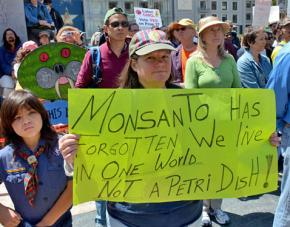Standing up to Monsanto
and report on California protests against Monsanto's corporate greed and poisoning of the planet.
IN CALIFORNIA, actions were held from Eureka to San Diego on May 25 for the March Against Monsanto," as a part of an international call to action against the corporate giant. Protesters in Davis, Sacramento, Oakland, San Francisco and beyond took part in solidarity efforts to bring awareness to Monsanto's global domination of the food supply.
In Sacramento, about 1,500 protesters took to the streets with banners, colorful signs and children in tow, chanting, "We don't want no GMO, shut down Monsanto." Police officers tried to contain demonstrators on the sidewalk, but they spilled into the streets.
Activist Steven Payan of the Anti-Monsanto Project, which hosted the event, was happy to see support from the community. "I felt the March Against Monsanto event empowered millions worldwide, with 52 participating countries and over 400 protests globally," he said. "The protest was monumental not only by marching but organizing because the only secured community is an organized community."
After the march, attendees were engaged with speakers, dancing, music and more on the north side of the Capitol building. Upon their arrival from the march, Kalpulli Tlayolotl performed opening blessings and focused warrior dances on the killing of mother earth and protection of the world¹s youth.

POOR magazine/Prensa POBRE members rapped poetry on food issues associated with Monsanto, highlighting that the most impoverished face access issues to healthy, safe, organic and non-genetically modified (GMO) food. Keynote speaker Eda Zavala Lopez emphasized protecting the rainforest and stopping Monsanto's destruction of the Amazon.
A seed exchange allowed attendees to take home heirloom non-GMO seeds from Petaluma Seed Bank to plant or save, which stresses the importance of saving non-GMO seed. Monsanto maintains patent rights to over 96 percent of GM seeds, according to the Center for Food Safety's report, "Seed Giants vs. U.S. Farmers."
Concurrent with the seed exchange, a teach-in was held on the revolving-door effect between politicians and Monsanto's executives. The teach-in cited Michael Taylor, a former Monsanto vice president, appointed by President Obama to be the current Food and Drug Administration deputy commissioner for Foods. In addition, Supreme Court Justice Clarence Thomas was previously a chief attorney for Monsanto.
The workshop included a brief presentation, small-group discussion and a call to action for participants to educate their communities or get involved with organizing efforts with the Anti-Monsanto Project.
JUST A couple hours away, in San Francisco, over 1,000 people in alien, biotech costumes with painted banners, posters and puppets began their March Against Monsanto from Union Square down Powell Street at noon.
The action, organized by a coalition of food activists, was sparked by intense anger at Monsanto and other Big Food and Agriculture's $44 million in contributions to the victorious "No on proposition 37" campaign. Prop 37 would have mandated the labeling of GMO foods.
Participants, including Yo Soy 132, a student organization based in Mexico, expressed their outrage over GMO corn. The group spoke powerfully about the impact of companies like Monsanto in Mexico--including setting up GMO corn in direct competition with indigenous organic farmers.
"What world are we leaving for our children? In Latin America, they are taking everything, now even our corn. Our people are going hungry, and our farmers can¹t compete with their transgenic corn," said a member of Yo Soy 132. Speakers also stressed the extreme repression faced by the student movement in Mexico.
John, a member of Veterans for Peace, talked about the importance of the demonstrations:
I just turned 49, and food I ate as a child is not available today. Seventy-five percent of food you see in the grocery store is poison, but people buy it because it's on special. The food crisis disproportionately affects African Americans and Latinos. If you look at places like Taco Bell, they target low-income people with gimmicks. It's painful to see Latino brothers and sisters eating the worst food.
Shawna, another protester said, "I feel guilty because I can¹t afford to buy organics, but also resent that there's such privilege around food."
Chris Kanthan, author of Deconstructing Monsanto talked about how to recruit "passionate food warriors" by talking about Monsanto in simple terms that even a 5 year old can understand. He suggested referring to GMOs as "genetically mutated organisms."
He explained that when Monsanto's patented Round-Up-resistant gene is forced into a plant's cells, that plant is able to absorb the pesticide that is sprayed on the field without being damaged. That plant has the Round-Up pesticide inside it--from the seed's gene modification, so when you eat the plant you are having "Monsanto's Round-Up as your salad dressing."
Kanthan also stressed that the most apocalyptic impact is in the way it¹s killing bees and frogs.
Filmmaker, Deborah Koons Garcia, director of The Future of Food (which was shown widely in Mendocino County and which helped lead to the passage of Proposition H, banning GMOs) spoke about her newest film, Symphony of the Soil, which explores how Monsanto and other industrial farm products are destroying the living organisms essential to soil fertility.
In the coming weeks, Sacramento action organizers will evaluate May 22 lobbying and outreach efforts while trying to build a California coalition against Monsanto. In the Bay Area, the March Against Monsanto will be discussed at a forum on "System change, not climate change," about how capitalism is killing the planet and how we can fight back, on June 14 at 7 p.m. at the Niebyl Proctor Marxist Library, 6501 Telegraph Ave. in Oakland. The event is hosted by Bay Area Eco-Socialists.


